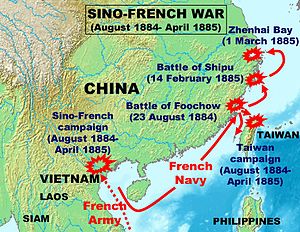Sino-French war
| Sino-French War | |||||||||
|---|---|---|---|---|---|---|---|---|---|
| Part of the Tonkin Campaign | |||||||||
 Operations of the Sino-French war (1884–85) |
|||||||||
|
|||||||||
| Belligerents | |||||||||
|
|
Black Flag Army |
||||||||
| Commanders and leaders | |||||||||
|
|
Liu Yongfu |
||||||||
| Strength | |||||||||
| 15,000 to 20,000 soldiers | 25,000 to 35,000 soldiers (from the provinces of Guangdong, Guangxi, Fujian, Zhejiang and Yunnan) | ||||||||
| Casualties and losses | |||||||||
| 2,100 killed or wounded | 10,000 killed or wounded | ||||||||
France and Qing declared victory
The Sino–French War (Chinese: 中法戰争; pinyin: Zhōngfǎ Zhànzhēng, French: Guerre franco-chinoise, Vietnamese: Chiến tranh Pháp-Thanh), also known as the Tonkin War and Tonquin War, was a limited conflict fought from August 1884 through April 1885, to decide whether France would supplant China's control of Tonkin (northern Vietnam). Although the Chinese armies performed better than in other nineteenth-century wars and the war ended with French defeat on land, the French achieved most of their aims in the Treaty of Tientsin.
French interest in northern Vietnam dated from the late 18th century, when the political Catholic priest Pigneau de Behaine recruited French volunteers to fight for Nguyễn Ánh and help begin the Nguyễn Dynasty, in an attempt to gain privileges for France and for the Roman Catholic Church. France began its colonial campaign in 1858, annexing several southern provinces in 1862 to form the colony of Cochinchina.
French explorers followed the course of the Red River through northern Vietnam to its source in Yunnan, arousing hopes for a profitable trade route with China that could bypass the treaty ports of the Chinese coastal provinces. The main obstacle to this idea, the Black Flag Army - a well-organized bandit force led by the formidable Liu Yongfu - was levying exorbitant "taxes" on Red River trade between Sơn Tây and Lào Cai on the Yunnan border.
...
Wikipedia
